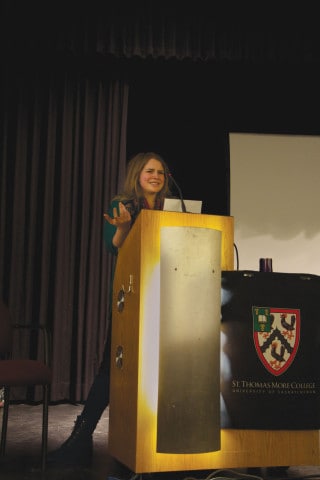TAYLOR BOROWETZ
On March 24, a panel of local activists gathered at the University of Saskatchewan to speak about their different experiences with working towards change within the province.
However, having the Saskatchewan-based activists speak was not the original plan for the evening. The event, Solidarity in Resistance: The Personal Costs and Political Consequences of Organizing for a Better World, was held to support three social and environmental activists from the Dominican Republic that were denied visitor visas and subsequently entry into Canada.
All three of the delegates were members of La Federación de Campesinos Hacia el Progreso (The Federation of Farmers Towards Progress), which is a grassroots organization of small farmers in the region of Bonao, DR that aim to improve the quality of life of the farmers in the area and protect natural resources. Esteban Polanco is La Federación’s executive director, Cristina Cortorreal is the president and Rubén Darío García is a publicly engaged community organizer in the Dominican Republic.
The speaking tour was arranged in partnership with the University of Saskatchewan, Western University and the University of Toronto. Each university raised funds and provided letters of support for Polanco, Cortorreal and García, outlining their itineraries and reasons for travel.
Caitlin Ward, engaged learning co-ordinator at St. Thomas More College, said that the fact that the three activists who were denied their visas had been fighting Canadian mining companies should not be overlooked.
Ward is a member of the Friends of La Federación, a group of U of S students, staff and faculty involved in the cause and the organization of the speaking tour. Although their original plans fell through, the group would not settle for silence.
Irena Smith, another member of Friends of La Federación, provided opening remarks for the evening.
“Tonight is a night for us… to stand together and say ‘no’ to fear, say ‘no’ to silencing, say ‘no’ to a capitalist ideologue state and continue to work towards a country based

Irena Smith spoke at the event Solidarity in Resistance: The Personal Costs and Political Consequences of Organizing for a Better World.
on love, solidarity and respect for all living things.”
Smith also drew parallels between the struggles faced in the Dominican Republic and the struggles faced by farmers and indigenous leaders in Saskatchewan whose livelihoods are threatened by resource extraction.
“We shouldn’t have to fight the government that we have elected to represent us. We shouldn’t have to fight them this hard to live well, but we do and that is why we wanted to come together tonight: to gather people’s strengths, to better understand what we are up against and to discuss how we can build solidarity in resistance,” Smith said.
Instead of the members of La Federación, a panel was put together with Saskatchewan activists who shared their experiences with overcoming resistance.
The panelists included Erica Lee, who is involved with Idle No More, a social and political movement headed by indigenous peoples aimed at putting a stop to the exploitation of culture and land in Canada. Lee discussed how indigenous people have not always lived with the borders that modern-day governments use. By subsequently restricting the mobility of indigenous people, she explained how the current use of borders is a violation of human rights.
With a long career of activism in Saskatchewan, Tracey Mitchell spoke of her personal journey, challenges and how activists can better support each other. She described the toll that activism can take on one’s life and health, but also how fulfilling and rewarding it is to be a part of a social movement.
Justine Shenher talked about her work with Just Youth through Development and Peace, a Catholic international development organization in Canada. Speaking from her experience with Just Youth, Shenher provided a description of what happens to activist organizations when their funding is cut or can only be used on predetermined programs.
Tying back into the Dominican Republic, Candyce Paul addressed some of the struggles faced by indigenous people in northern Saskatchewan which are similar to those faced in the Dominican Republic. Based off of her work to reduce nuclear waste in northern Saskatchewan with the Committee for Future Generations, Paul spoke about the struggle with pollution from the Canadian mining companies in Canada that is posing a massive health risk to those who live off of the land.
Mylan Tootoosis is a PhD student at the U of S in the department of native studies. Since he is continuing the work that his ancestors and leaders have done to build solidarity and create a better world, Tootoosis said that he does not consider himself an activist.
After the program, the panel addressed questions from the audience followed by the closing remarks and reception.
Though Polanco, Cortorreal and García were not able to enter the country themselves, their ideas continue to garner support from their Canadian supporters and the denial of their visas continues to receive media coverage.
—
Katherine Fedoroff/Photo Editor